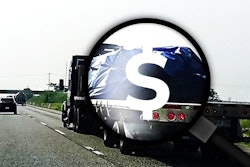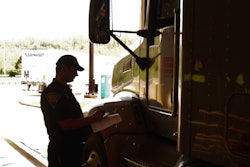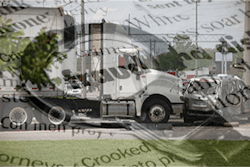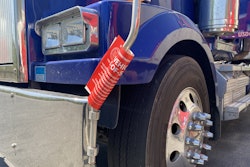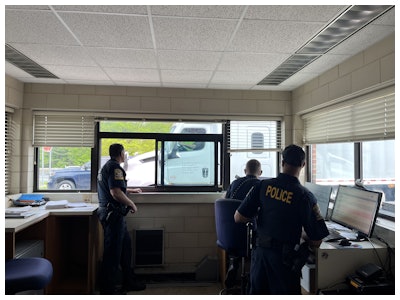
Roadcheck 2025 came and went last week with a focus on hours of service and tires, and Overdrive hit the scales on I-84 in Union, Connecticut, after a swing-and-miss looking for open coops in Massachusetts. Connecticut State Police invited us out to not only observe a Roadcheck event but also an outing of COBRA, or Collaborative Operation by Response Agencies -- it included Homeland Security and members of Connecticut's DMV and DOT both, even drug enforcement branches.
The result was a packed, bustling Roadcheck event unlike anything we've seen in years.
Approaching the scales, rest areas stood packed with trucks maybe just ever so slightly hesitating before coming face to face with inspectors. According to Connecticut State Police Sergeant Dick Murchison, they're likely not really evading anything. Not only does Connecticut use aircraft (yes, real-life bears in the air) to check for scale-dodgers, they have hardcore COBRA enforcement events before and after Roadcheck too.
"We’re going to do this more at our Middletown scale than the other one down in Greenwich," he said. Weather permitting, "our aviation unit will come take out the helicopter or the airplane. It's not uncommon for trucks to get off the prior exit and try to get around" inspections.

For those who did approach the scales, they rolled up a ramp with a mechanism not only to check weight but tire inflation, too, he said. "We have all the electronic screening," said Murchison. "We will actually flag something if it's overweight, but we can manually bypass that" and send all the trucks in for inspection, as they did on Thursday, the final day of Roadcheck.
There's was plenty in the way of log checks and tire thumping, yet other enforcement questions and issues loomed large over the scales, including freight fraud and English language proficiency.
Having hastily applied paper numbers flapping on the door of the truck can raise a red flag these days with any guard shack that has a clue, even some of the automated options. That's particularly the case given the ways fraudulent brokers and carriers buy and sell MC numbers and USDOT numbers or impersonate legitimate carriers to double broker or even steal loads. More than one truck crossed the scales with a taped-down printout on the door. Sometimes, tape appeared to have been put on and taken off more than once.
 Such a taped-on printout can be a red flag for inspectors, too. Connecticut enforcement pulled in this truck with a paper printout of a DOT number affixed to the door.
Such a taped-on printout can be a red flag for inspectors, too. Connecticut enforcement pulled in this truck with a paper printout of a DOT number affixed to the door.
 This truck got pulled in for missing a digit in the USDOT number. The carrier ended up being not authorized. "Huh," the driver scratched his head. "I wonder how that happened."
This truck got pulled in for missing a digit in the USDOT number. The carrier ended up being not authorized. "Huh," the driver scratched his head. "I wonder how that happened."
[Related: FMCSA, police investigate double broker's odd inspections history]
One driver got dinged $2,250 for his trailer standing just an inch overheight at 13'7". "That hurts," the officer said while issuing the fine.
"We do have a lot of low bridges here," said Murchison.
 An eagle-eyed Connecticut DOT inspector flags a Kenworth for hauling a trailer just one inch too tall.
An eagle-eyed Connecticut DOT inspector flags a Kenworth for hauling a trailer just one inch too tall.
Both drivers who claimed to lack English proficiency (the reading portion) and who described other communications issues with officers were on hand, too. (One said he couldn't understand the officer over the noise, and wasn't sure if he was free to leave, and that was hours ago.)
Asked if Connecticut had changed in any way its enforcement of ELP since President Donald Trump's executive order on the regulation requiring drivers communicate in English, Murchison joined six other states Overdrive has spoken to and said nothing has changed yet.
"As it is now [drivers are] allowed to use electronic devices for translators," he said. "If they still are having problems understanding even with the translator, it needs to be documented so if a DataQ comes you can say, 'OK, it’s documented that this guy still couldn’t understand,'" he said. Otherwise, Connecticut hadn't put anyone out-of-service for ELP yet this year.
Murchison said the language barriers continue to hold back equal enforcement of the law in some cases. "There are some [drivers] that have the translator and you can just tell them turn the blinkers on and have no issues," said Murchison. "Other ones, sometimes you can’t do a full inspection, because they’re not understanding, and it’s too dangerous for us to get under the truck."
Other law enforcement officials have reported the same.
[Related: Truck drivers' English language proficiency and the inspections problem]
On the issue of "cabotage," or Mexican- or Canadian-domiciled drivers entering the U.S. with a load legally, then breaking the law by picking up and delivering again within the U.S., Murchison said Homeland Security kept an eye on that. He added it wasn't entirely uncommon for Connecticut law enforcement to see a Mexican driver hauling a load that far Northeast.
When it comes to the mostly unanswered question of how many foreign citizen non-domiciled CDL holders are operating in the U.S. today, law enforcement during Roadcheck didn't provide any answers. We did speak to a non-citizen driver at the scale who was put out-of-service given his carrier's prior authority revocation. Murchison drew a line between the question of citizenship and the question of safety.
If a driver has a non-domiciled CDL, "but he took the CDL program like everyone else did, and he passed it, I certainly don't see an issue with it," he said. "It doesn't bother us one bit as long as you're legitimate and following the rules and regulations."
Murchison had a few "screens at the wheel" horror stories, much in line with a lot of what's been reported in the past.
[Related: Driver caught using tablet at highway speeds on I-80]
When there's unsafe driving, Murchison gave the impression that Connecticut drops the hammer. "At the state police here, we do all the fatal collision" investigations involving commercial trucks. "We do a thorough investigation. We go through the carrier, go through the driver, his actions, and go through the truck to see if there's a reason why he crashed. There could be charges to a driver. We basically look at it as an unintentional homicide, in a way."
Asked to weigh in on which carriers gave him more problems, big fleets or small, Murchison took a nuanced view.
"The larger carriers have more to lose in the long run," he said. "If you think about it, if you've got one or two trucks out there compared to Western Express or Swift that have thousands, they have a higher risk. If you own one truck and your safety rating starts going up, it's going to cost a little more in insurance, but when you have more trucks, it's going to go up hundreds of dollars per truck."
Murchison said the big fleet trucks, too, have a big budget for making service calls and hiring safety officers. "Once a guy hauling hazmat said he had a guy coming from New Jersey with the exact tire he wants, because he doesn't want some off-brand tire."
Ultimately, there's no real winner between fleets small and large, Murchison noted. He and the rest of the team there focus on getting the message out about safety, and everyone can use the occasional timely reminder. "Some of the bigger carriers have great equipment, but it’s not the equipment" presenting problems, "it’s HOS or their driving. Or other companies have great drivers but they're deficient in brakes, tires," things like that. "We try to be fair and reasonable with everyone," he added. "Our goal here, its to make the highway safe and to educate."
[Related: Inspections should be 'preventive', not 'punitive': Owner-operator]

